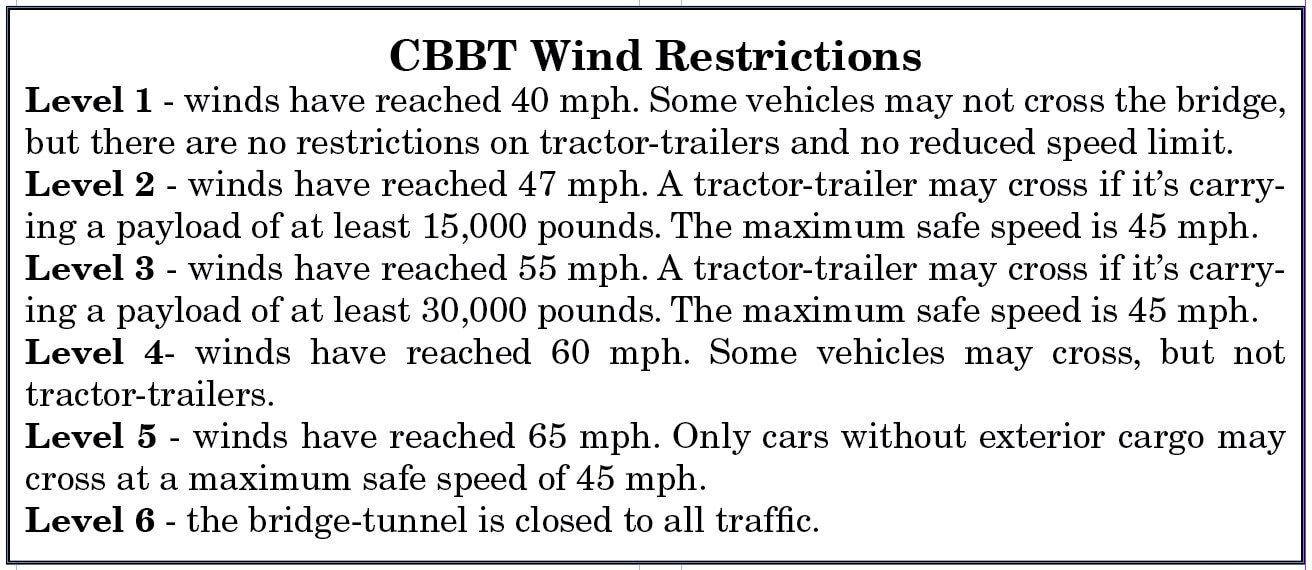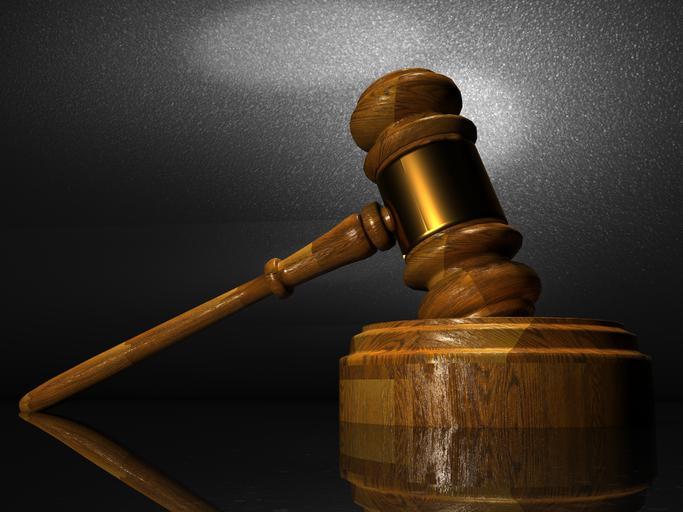By Stefanie Jackson – A widow filed a $6 million lawsuit against the Chesapeake Bay Bridge-Tunnel (CBBT), claiming the bridge-tunnel is responsible for the death of her husband, Joseph Chen, a long-haul driver whose tractor-trailer plummeted over the side of the bridge nearly three years ago, Feb. 9, 2017.
The case was filed in Norfolk Aug. 10, 2018, and transferred to Northampton Circuit Court Jan. 19, 2020.
Billie Jo Chen believes her husband would still be alive today if the bridge-tunnel had followed its policies and prohibited him from crossing the bridge in windy conditions.
Those policies include six levels of restriction imposed on drivers during specific wind conditions, ending with closing the bridge-tunnel to all traffic when winds exceed 65 mph.
 On the morning of Feb. 9, 2017, wind gusts at the bridge-tunnel were reaching 60 mph. Level 4 wind restrictions were imposed at 7:24 a.m.
On the morning of Feb. 9, 2017, wind gusts at the bridge-tunnel were reaching 60 mph. Level 4 wind restrictions were imposed at 7:24 a.m.
According to a report by the Virginian-Pilot, Joseph Chen phoned his employer at approximately 8 a.m. with concerns about the weather. He worked for Evans Seafood in North Carolina.
High winds persisted throughout the morning, but by noon, a decision had been made to allow most traffic to proceed.
According to Billie Jo Chen’s law- suit, Chesapeake Bay Bridge-Tunnel authorities were “knowingly and will- fully ignoring their own data and basic weather forecasting, ignoring common sense of length of time to cross the bridge, and arbitrarily reducing restrictions to Level 1 to allow for built- up traffic to cross.”
At 12:01 p.m., wind restrictions were dropped to Level 1, even though equipment on Island 4 – the manmade island closest to the south side of the bridge, where Joseph Chen began his crossing – recorded a wind gust of 47 mph, which should have triggered Level 2 wind restrictions.
The CBBT computer system records wind speeds every minute, and they are monitored 24/7.
Feb. 9, 2017, from noon to 12:30 p.m., wind gusts of 47 mph to 50 mph persisted.
If Level 2 wind restrictions had been in place during that period, Chen would not have been permitted to cross the bridge, since his tractor-trailer held about 4,000 pounds of seafood, according to an Eastern Shore Post report. That was far below the minimum payload of 15,000 pounds.
Chen started across the bridge-tunnel around 12:15 p.m. At about 12:21 p.m., when the wind was gusting at 50 mph, the tractor-trailer went over the guardrail on the left side of the bridge, near mile marker 15. The tractor-trailer plunged into the 45-degree water below.
The Virginia Beach Fire Department was called. Weather conditions prohibited a marine response, but at 12:36 p.m., about 15 minutes after the accident, a U.S. Navy Redhawk helicopter was dispatched.
Chen, who had managed to escape his vehicle, was located at 12:58 p.m. He was rescued at 1:01 p.m. and airlifted to Sentara Norfolk General Hospital.
He was pronounced dead at 1:14 p.m. The cause of death, hypothermia, was later confirmed in an autopsy report by the Norfolk Medical Examiner’s Office.
Level 2 wind restrictions were not declared at the bridge-tunnel until 12:49 p.m., nearly a half-hour after Chen’s accident. About five minutes earlier, wind gusts had hit 59 mph, which ordinarily would trigger Level 3 restrictions.
Level 3 wind restrictions were declared at 6:01 p.m.
In addition to strong winds, Chen’s driving may have been a factor in the accident, according to witnesses.
In an unsworn statement, Debra Davis, of Hampton, Va., said she was driving about 35 mph in the left southbound lane when a tractor-trailer (not Chen’s vehicle) passed her on the right.
A second tractor-trailer (Chen’s vehicle) pulled up in the right lane, behind the first tractor-trailer. He was traveling “much faster” than 35 mph.
He “cut in front of my car,” attempting to pass, Davis said.
Two passengers in her car also witnessed the incident.
Alisa Reed-Lofton, of Chesapeake, Va., said Chen tried to pass, “but there was not enough room,” and “he missed our car by maybe eight to 10 feet.” Jennifer Chavez, of Virginia Beach, Va., wrote a similar statement.
Both women agreed “he was speeding.” Chavez said the wind caught the tractor-trailer, and as the vehicle went over the guardrail, the gas tank fell and fuel spilled on the road.
Davis pulled over and Chavez dialed 911.
Two other tractor-trailer drivers witnessed the accident – Tim Harris and Steve Wilhelm, both of North Carolina.
Wilhelm said he saw Chen’s truck lean to the left and set back down before the truck took a “hard left” and went through the railing.
Harris did not believe Chen was speeding. “Joe was going about 35 mph,” he wrote.
No information about Chen’s speed could be obtained from the “black box” in his truck, because the device was too damaged.
The Chesapeake Bay Bridge and Tunnel District, represented by attorney Jeffrey Hunn, of the Pender & Coward law firm in Virginia Beach, responded to the lawsuit with a plea of “sovereign immunity.”
It’s a legal term meaning the government and its departments and agencies cannot be sued without its consent.
The Chesapeake Bay Bridge and Tunnel District and Commission, originally called the Chesapeake Bay Ferry District and Commission, is a government entity that was created by the Virginia General Assembly in 1954.
But Billie Jo Chen’s attorney, Amanda Dure, of the Pangia Law Group in Washington, D.C., contends that the Chesapeake Bay Bridge-Tunnel is not immune from its negligence.
The lawsuit stated the CBBT was negligent for re-opening the bridge, failing to use its rescue system including ropes, throw rings, and other tools, and maintaining a defective guardrail.
The lawsuit added that CBBT authorities were aware of at least 12 previous occasions during which guard- rails failed to prevent a tractor-trailer from running off the bridge.
Billie Jo Chen is seeking damages on several grounds, including the pain and suffering of her husband, Joseph Chen, their daughter, Jordan Danielle Chen, their son, Christopher Hawkins, and herself.
A four-day jury trial is scheduled to begin Tuesday, July 14, 9 a.m., in the Northampton County Circuit Court.
Judge W. Revell Lewis III recused himself from the trial, and Judge Leslie L. Lilley, of the second circuit, will preside.



